动词与介词搭配
高中英语知识点归纳介词短语和动词短语的搭配
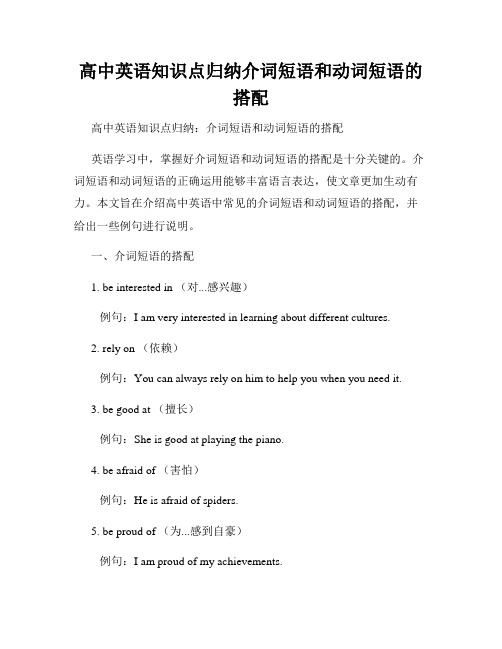
高中英语知识点归纳介词短语和动词短语的搭配高中英语知识点归纳:介词短语和动词短语的搭配英语学习中,掌握好介词短语和动词短语的搭配是十分关键的。
介词短语和动词短语的正确运用能够丰富语言表达,使文章更加生动有力。
本文旨在介绍高中英语中常见的介词短语和动词短语的搭配,并给出一些例句进行说明。
一、介词短语的搭配1. be interested in (对...感兴趣)例句:I am very interested in learning about different cultures.2. rely on (依赖)例句:You can always rely on him to help you when you need it.3. be good at (擅长)例句:She is good at playing the piano.4. be afraid of (害怕)例句:He is afraid of spiders.5. be proud of (为...感到自豪)例句:I am proud of my achievements.6. be similar to (类似于)例句:This dress is similar to the one she wore to the party.7. be different from (不同于)例句:His opinion is different from mine.8. be keen on (热衷于)例句:She is keen on playing basketball.9. be famous for (因...而闻名)例句:Paris is famous for its beautiful architecture.10. be worried about (为...担心)例句:My parents are worried about my exam results.二、动词短语的搭配1. take part in (参加)例句:She took part in the school talent show.2. get along with (与...相处)例句:He gets along well with his classmates.3. look forward to (期待)例句:I am looking forward to my summer vacation.4. give up (放弃)例句:Don't give up easily when faced with difficulties.5. come up with (提出,想出)例句:He always comes up with creative ideas.6. make up (弥补)例句:I need to make up for the time I wasted.7. put off (推迟)例句:The meeting has been put off until next week.8. get used to (习惯于)例句:It took me some time to get used to the new environment.9. look up (查阅)例句:You can look up the meaning of unknown words in the dictionary.10. break up (分手)例句:They decided to break up after years of being together.三、总结通过本文的介绍,我们了解了高中英语中常见的介词短语和动词短语的搭配。
语法突破技巧动词与介词的固定搭配

语法突破技巧动词与介词的固定搭配动词与介词的固定搭配是英语语法中的一个重要部分。
掌握这些固定搭配能够帮助我们更准确地使用动词,使语言表达更加地流畅和准确。
本文将介绍一些常见的动词与介词的固定搭配,并分享一些突破语法难点的技巧。
一、动词 + 介词的固定搭配1. Think about:考虑到例如:I need some time to think about your proposal.(我需要一些时间来考虑你的提议。
)2. Listen to:听例如:She always listens to music while she is working.(她总是边工作边听音乐。
)3. Look for:寻找例如:He is looking for a new job.(他在寻找新的工作。
)4. Talk to:与...交谈例如:I need to talk to her about the project.(我需要和她谈谈这个项目。
)5. Believe in:相信例如:I believe in you. You can do it!(我相信你。
你可以做到!)6. Rely on:依靠例如:I rely on my friends for support in difficult times.(在困难时期,我依靠我的朋友们的支持。
)7. Apologize to:向...道歉例如:He apologized to me for his mistake.(他为他的错误向我道了歉。
)8. Depend on:依靠,取决于例如:The success of the project depends on your contribution.(项目的成功取决于你的贡献。
)以上只是一些常见的动词与介词的固定搭配,要注意的是,英语中的动词与介词的搭配并不是固定不变的,有时同一个动词会搭配不同的介词,表示不同的意思。
初中英语知识点归纳动词和介词的搭配用法
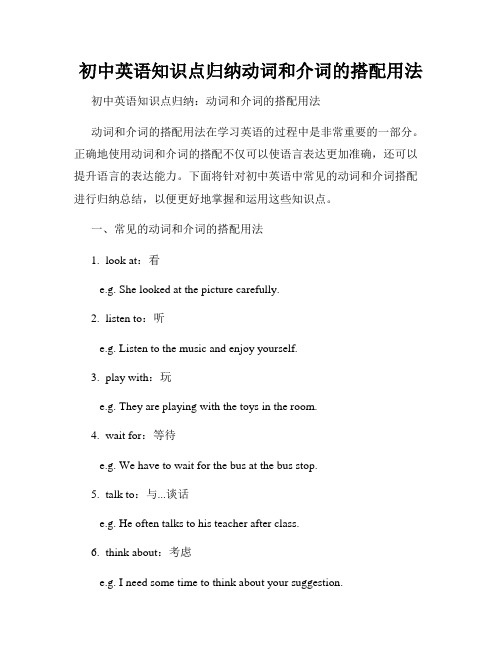
初中英语知识点归纳动词和介词的搭配用法初中英语知识点归纳:动词和介词的搭配用法动词和介词的搭配用法在学习英语的过程中是非常重要的一部分。
正确地使用动词和介词的搭配不仅可以使语言表达更加准确,还可以提升语言的表达能力。
下面将针对初中英语中常见的动词和介词搭配进行归纳总结,以便更好地掌握和运用这些知识点。
一、常见的动词和介词的搭配用法1. look at:看e.g. She looked at the picture carefully.2. listen to:听e.g. Listen to the music and enjoy yourself.3. play with:玩e.g. They are playing with the toys in the room.4. wait for:等待e.g. We have to wait for the bus at the bus stop.5. talk to:与...谈话e.g. He often talks to his teacher after class.6. think about:考虑e.g. I need some time to think about your suggestion.7. take off:脱下e.g. Please take off your shoes before entering the house.8. put on:穿上e.g. Don't forget to put on your coat before going outside.9. get on:上(车、船、飞机等)e.g. We need to get on the bus now, or we'll be late.10. get off:下(车、船、飞机等)e.g. We got off the train at the next station.11. look for:寻找e.g. She is looking for her lost key everywhere.12. give up:放弃e.g. Don't give up easily, keep trying and you will succeed.13. take care of:照顾e.g. My parents are old, so I have to take care of them.14. be proud of:以...为骄傲e.g. I am proud of my brother, he won the first prize in the competition.15. rely on:依靠e.g. You can rely on me, I will always be there for you.二、动词和介词的搭配用法小结通过以上的例子,我们可以得出以下一些结论和注意事项:1. 动词和介词的搭配使用相对固定,一般不能更换,需要注意记忆。
介词的用法及与动词搭配的规律

介词的用法及与动词搭配的规律介词是语法中的一类虚词,常用来表示名词、代词与其后的其他成分之间的关系。
在英文中,介词的使用非常频繁,因此了解介词的使用规律对于正确理解和运用英语语法至关重要。
本文将介绍介词的常见用法,并探讨介词与动词搭配的规律。
一、介词的用法1. 表示地点:at, in, on- at用于具体点的位置,如at the park (在公园),at the bus stop (在公交车站)。
- in用于较大区域范围,如in the city (在城市里),in the room (在房间里)。
- on用于平面或曲面的表面,如on the table (在桌子上),on the wall (在墙上)。
2. 表示时间:at, in, on- at用于具体的时间点,如at 9 o'clock (在九点),at noon (在中午)。
- in用于较长的时间段,如in April (在四月),in the evening (在晚上)。
- on用于具体的日期或星期几,如on Monday (在星期一),on June 1st (在六月一日)。
3. 表示方式:by, with- by表示通过某种工具或方法,如by car (乘坐汽车),by email (通过电子邮件)。
- with表示伴随的方式,如with a smile (带着微笑),with great enthusiasm (充满热情地)。
4. 表示原因:because of, due to- because of和due to都可以表示原因,但due to用于正式场合,后接名词或名词短语,而because of更常用,并且后接名词、代词或动名词短语。
5. 表示目的:for, to- for表示目标或目的,如study for the exam (为了考试而学习)。
- to表示动作的方向或目标,如go to school (去学校)。
介词与动词搭配的特殊意义

介词与动词搭配的特殊意义介词是语法中的一种词类,它与动词搭配时可以赋予动词特殊的意义。
这些特殊意义的表达方式多样,且在语言中广泛应用。
本文将探讨几种常见的介词与动词搭配,以及它们所带来的特殊意义。
一、"to"与动词搭配1. 含义上的特殊意义:- look forward to:期待,盼望- get used to:习惯于- be accustomed to:习惯于- contribute to:对......做出贡献2. 格式上的特殊意义:- agree to:同意- object to:反对- consent to:同意- refer to:参考二、"with"与动词搭配1. 含义上的特殊意义:- sympathize with:同情- be familiar with:熟悉- be pleased with:对......满意- deal with:处理2. 格式上的特殊意义:- be equipped with:装备有- cover with:覆盖,涂抹- stick with:坚持三、"at"与动词搭配1. 含义上的特殊意义:- laugh at:嘲笑- aim at:以......为目标- look at:看- smile at:对......微笑2. 格式上的特殊意义:- arrive at:到达- be good at:擅长- stare at:盯着看- shout at:对......大声喊叫四、"in"与动词搭配1. 含义上的特殊意义:- believe in:相信- result in:导致- succeed in:成功- specialize in:专注于2. 格式上的特殊意义:- take part in:参与- engage in:参加- believe in:相信- result in:导致五、"on"与动词搭配1. 含义上的特殊意义:- depend on:依赖- insist on:坚持- rely on:依靠- focus on:集中于2. 格式上的特殊意义:- count on:指望- rely on:依赖- reflect on:反思- insist on:坚持以上只是介词与动词搭配的部分特殊意义的举例,实际上还有很多其他搭配方式。
常用英语动词与介词搭配
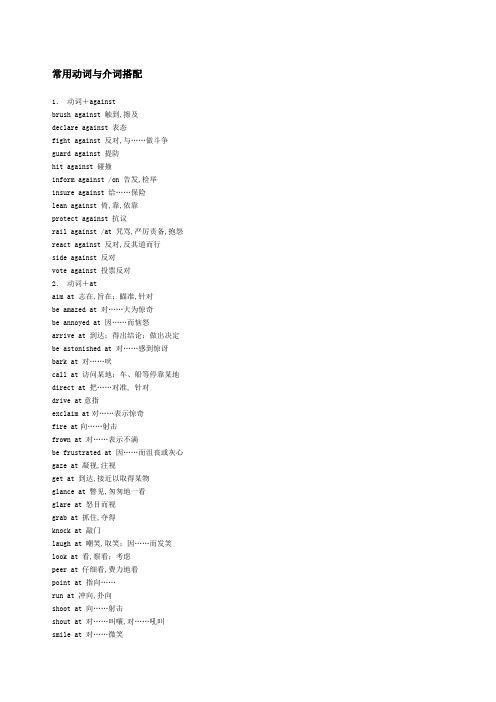
常用动词与介词搭配1.动词+againstbrush against 触到,擦及declare against 表态fight against 反对,与……做斗争guard against 提防hit against 碰撞inform against /on 告发,检举insure against 给……保险lean against 倚,靠,依靠protect against 抗议rail against /at 咒骂,严厉责备,抱怨react against 反对,反其道而行side against 反对vote against 投票反对2.动词+ataim at 志在,旨在;瞄准,针对be amazed at 对……大为惊奇be annoyed at 因……而恼怒arrive at 到达;得出结论;做出决定be astonished at 对……感到惊讶bark at 对……吠call at 访问某地;车、船等停靠某地direct at 把……对准, 针对drive at意指exclaim at对……表示惊奇fire at向……射击frown at 对……表示不满be frustrated at 因……而沮丧或灰心gaze at 凝视,注视get at 到达,接近以取得某物glance at 瞥见,匆匆地一看glare at 怒目而视grab at 抓住,夺得knock at 敲门laugh at 嘲笑,取笑;因……而发笑look at 看,察看;考虑peer at 仔细看,费力地看point at 指向……run at 冲向,扑向shoot at 向……射击shout at 对……叫嚷,对……吼叫smile at 对……微笑snap at 猛咬;厉声说话,怒声责骂stare at 盯着看throw at 向……投掷work at 从事,致力于,研究3.动词+foraccount for 说明……原因,解释act for 代理aim for 瞄准;打算,企图;致力,旨在allow for 考虑到apologize for 为某事道歉;为某事表示歉意appeal for 呼吁,恳求apply forarrange for申请arrest sb. for 为……做准备ask for 要求得到;自己招惹麻烦等beg for 请求得到bid for 出价,竞价blame sb. for 因……而责备某人budget for 编预算,为……做安排charge …for 索价,收费cheer for 为……欢呼,为……喝彩criticize for 因……批评declare for 表示支持depart for 动身前往……die for 渴望,切望dig for 搜寻,探究,细查exchange …for 以……换excuse … for原谅feel … for 摸索,寻找file for 提出forgive sb. for 因……而宽恕或原谅某人head for 向……行进hope for 希望hunger for 渴望inquire for 询问,探问leave … for 离开……去……,身去……long for 渴望look for 寻找;招惹make for 走向mistake … for错把……当作pay for 付钱,赔偿pine for 渴望,思念plan for 为……订计划praise sb. for 因为……而表扬某人pray for 祈求,请求prepare for 为……做准备prescribe … for 为……开药prospect for 勘探,勘察provide sth. for sb. 为某人提供某物qualify sb. for 使某人具有资格,使某人胜任run for 竞选scold sb. for 因……而责骂或训斥某人search for 寻找,搜寻seek for 寻找,探求struggle for 为……而奋斗substitute …for 以……代替tender for投标thank sb. for 因……而感谢某人thirst for /after 渴望,渴求treat sb. for 为某人治……病vote for 投票赞成,投票选举某人wait for 等候want for 缺少watch for 守候;窥视;等待weep for 为……哭泣wish for 盼望,企求4.动词+fromarise from 由……引起,由……产生,起源于ban … from 禁止……做……bar … from 阻止……做benefit from 受益,得到好处come from 来自date from 追溯到depart from 背离,违反derive from 起源于,衍生于descend from 起源于,是……的后裔die from 因……而死亡differ from 与……不同discourage … from 劝阻……做dismiss .. from 开除,解雇棵;打消想法等distinguish … from 区别,把……与……区分开来draw … from 提取钱款;汲取教训等eli minate … from 将……从……中排除emerge … from 出现,产生于escape from 从……逃跑或逃走exclude …from 把……从……排除在外excuse … from 使免除责任、惩罚等flee from 从……逃走free … from 使摆脱,使解除graduate from 从……毕业,毕业于hear from 得到……的消息,接到……的来信infer … from 从……中推论出isolate … from 使……与……隔离keep … from 使……不做某事,阻止……做某事learn from 向……学习liberate … from 解放,使……获自由prohibit sb. from 禁止某人做protect … from 保护……使不受range from 在某范围内变动recover from 恢复,痊愈release … from 从……释放remove … from 从……移开,去掉restrain … from 阻止……做,抑制……做result from 由……造成,由……产生retire from 从……撤退retreat from 从……退却或撤退separate … from 把……分开,区分开来shelter from 躲避shield … from 保护shift from从……转移shrink from退缩,畏缩stem from起源于stop … from 组织suffer from 受……之苦tell … from 分清,区别,区分withdraw from 从……撤退5.动词+inbe absorbed inbelieve in 信仰,相信;主张,认为是好的break in 闯入;插嘴consist in 在于delight in 喜欢,以……为乐end in 以……告终,结果engage in 参加,从事于interfere in 干涉,干预invest in 投资involve … in 使牵连,使陷入;使承担join in 参加,加入key in 键入数据等launch in 使开始从事lie in 在于be located 坐落于major in 主修,专攻minor in 大学中副修participate in 参与,参加persist in 坚持result in 结果为,归结为specialize in 专门研究,专攻share in 分享,分担succeed in 在……成功,成功地完成trust in 相信,信任6.动词+intobreak into 强行闯入burst into 突然发作build … into 把……建成为change … into 把……变成combine … into 将……结合在一起convert … into 把……改变为,兑换develop into 发展成为divide … into 把……分成dig into 搜寻,探究,细查evolve into 发展成,演变成grow into 长成,发展成integrate into 使成为一体,使合并introduce … into将……引进到launch into 使开始从事penetrate into 渗入;洞察,了解pierce into 穿透,刺破plunge into 纵身投入resolve into 分解translate … into 将……译成turn … into 使变成7.动词+ofaccuse … of 指控,控告admit of 容许有,有……余地allow of 容许,容得,容许有approve of 赞同,赞许assure … of 向……保证,使……确信become of 发生……情况,……怎么啦boast of /about 夸耀,自夸cheat … of 欺骗clear … of 从……中除掉complain of 抱怨,诉苦consist of 由……组成,由……构成convince … of 使……确信,使……信服cure … of 治愈……疾病;矫正……不良习惯等demand … of 向……要求despair of 绝望die of 死于dispose of 去掉,丢掉,除掉dream of 梦想,渴望;考虑expect … of 对……有……希望hear of 听说过,听到的……事inform … of 通知,告诉learn of /about 获悉,得知,了解read of /about读到remind … of使……想起,提醒rid … of 使……摆脱,使……去掉rob … of抢走;使……失去smell of 有……的气味speak of谈到,讲到strip … of剥夺……的……suspect … of 怀疑,猜疑talk of /about 谈论taste of 有……味道,尝起来……think of 考虑,想起warn of 警告,事先告诉8.动词+onact on 按照……行事agree on 在……上意见一致base … on 把……建立在,以……为基础bet on 打赌blame … on责备,把……归咎于border on 近似,接近call on拜访某人;号召,请求comment on评论concentrate on 集中,全神贯注congratulate … on向某人祝贺count on 依靠;期待,指望decide on 决定depend on 依靠,依赖descend on 袭击experiment on 对……进行试验feed on 以……为食focus on 集中于,聚焦于impose … on 把……强加于impress … on 给……以深刻印象inform on 告发,检举insist on 坚持,强调keep on 继续land on 登陆,着陆lean on 倚;依靠live on 靠吃……生活;靠……生活operate on 给……动手术prevail on /upon说服,劝说,诱使pride oneself on引……为自豪react on /upon 起作用,影响reckon on 指望,盼望reflect on 考虑rely on 依靠;指望remark on 谈论,评论rest on /upon 依靠,依赖speculate on /about 推测,推断spend … on 在……方面花钱或时间step on 踩,踏上try on 试穿,试用wait on 服侍,伺候9.动词+toadapt … to 使适应于add … to 加到……上adjust … to 使适应于admit to 承认agree to 同意某一建议、安排等amount to 总计达;相当于,等于apologize to 向某人道歉appeal to 向……呼吁;诉诸于;对……有吸引力apply to 向某人申请appoint … to 任命某人担任……职务approximate to 近似,接近attach … to 将……连接到attend to 专心于,致力于attribute to 把……归因于,把过错、责任等归于belong to 属于challenge … to向……挑战,要求比赛、决斗等communicate … to 向……传达compare … to 把……比作;与……比较complain to 向某人投诉或抱怨confess to 承认;忏悔confine … to 把……限制在consent to 同意,答应contribute to 捐献,捐赠;有助于convert sb. to 使某人改信……correspond to 与……相当,与……相类似credit … to 把……归于descend to 把身份降至,沦为devote … to 为……而奉献direct to 把……对准,针对entitle … to 给……权利或资格expose … to 使……处于作用或影响之下,曝光extend to 延伸至,延续到flee to 逃到gear … to 使……适应,使……适合get to 到达;达到be inclined to 倾向于invite sb. to 邀请某人参加lead to 路等通向;导致limit … to 把……限制在link … to 使……与……连接obey to 服从,听从object to 反对occur to 被想到,出现在脑中be opposed to 反对owe … to 把……归功于point to 指向,指明prefer … to 喜欢……胜过……promote … to 提升至……岗位react to 对……做出反应reduce … to 使……降低到refer to 提到,涉及;查阅,参考relate to 有关,涉及remember … to 代……问候render … to 给予,提供reply to 对……做出回答report to 报到;隶属,对上司负责resign …to 使顺从resort to 诉诸,求助于respond to 回答,响应restore … to 使恢复到retire to 退回到shout to 大声叫某人stoop to 堕落到,降低身份做某事stretch to 延伸至subject to 使遭受,使服从submit to 服从,听从surrender to 投降;屈服talk to 对某人讲话transfer … to 调动到,转学到trust to 依靠,依赖turn to 找某人寻求帮助等yield to 投降,让步10.动词+withaccord with 相符合,相一致,相和谐agree with 同意某人的意见argue with 与某人争论或争吵arm … with 用……武装associate with 把……同……联系起来beam with 因……而面露喜色begin with 以……开始blend … with 使……与……混合charge sb. with 控告或指控某人犯……罪chat with 与某人聊天communicate with 与……通信,与……联系compare … with 把……与……相比compete with 与……竞赛conflict with 与……冲突,不一致confront with 迎面遇到,遭遇confuse … with 把……混同,把……与……混淆connect … with 把……与……联系起来consult with 同某人商议consume with 使着迷,充满contrast … with 与……对比,与……对照cooperate with 与……合作cope with 应付,处理correspond with 通信;相符,符合cover … with 用……覆盖deal with 对付,对待;处理,论述equip … with 用……装备exchange … with 和……交换experiment with 进行试验,做实验feed … with 向……提供finish with 做完,结束furnish … with 向……提供identify … with 把……和……等同起来illustrate … with 用……加以说明integrate … with 使成为一体,使合并interfere with 妨碍,干扰lie with 问题、事情等在于load … with给……装载meet with 偶然遇到;得到赞成等;遭到失败等part with 和……分开,舍弃present … with 给……提供proceed with 继续下去provide sb. with sth. 向某人提供某物quarrel with 与某人争吵react with 起化学反应reason with 与……说理,规劝rest with 取决于,在于be satisfied with 对……感到满意share … with与……合用side with 支持,站到的……一边supply … with 向……提供sympathize with 同情,怜悯;赞同talk with 与某人谈话threaten … with 以……相威胁toy with 漫不经心地考虑。
动词与介词的搭配
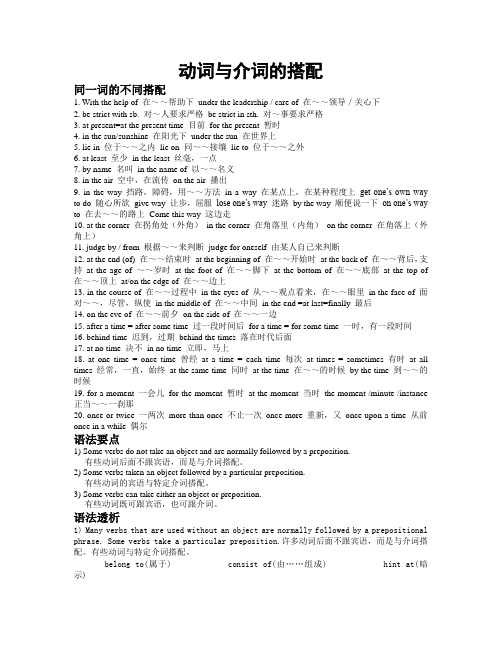
动词与介词的搭配同一词的不同搭配1. With the help of 在~~帮助下under the leadership / care of 在~~领导/关心下2. be strict with sb. 对~人要求严格be strict in sth. 对~事要求严格3. at present=at the present time 目前for the present 暂时4. in the sun/sunshine 在阳光下under the sun 在世界上5. lie in 位于~~之内lie on 同~~接壤lie to 位于~~之外6. at least 至少in the least 丝毫,一点7. by name 名叫in the name of 以~~名义8. in the air 空中,在流传on the air 播出9. in the way 挡路,障碍,用~~方法in a way 在某点上,在某种程度上get one’s own way to do 随心所欲give way 让步,屈服lose one’s way 迷路by the way 顺便说一下on one’s way to 在去~~的路上Come this way 这边走10. at the corner 在拐角处(外角)in the corner 在角落里(内角)on the corner 在角落上(外角上)11. judge by / from 根据~~来判断judge for oneself 由某人自己来判断12. at the end (of) 在~~结束时at the beginning of 在~~开始时at the back of 在~~背后,支持at the age of ~~岁时at the foot of 在~~脚下at the bottom of 在~~底部at the top of 在~~顶上at/on the edge of 在~~边上13. in the course of 在~~过程中in the eyes of 从~~观点看来,在~~眼里in the face of 面对~~,尽管,纵使in the middle of 在~~中间in the end =at last=finally 最后14. on the eve of 在~~前夕on the side of 在~~一边15. after a time = after some time 过一段时间后for a time = for some time 一时,有一段时间16. behind time 迟到,过期behind the times 落在时代后面17. at no time 决不in no time 立即,马上18. at one time = once time 曾经at a time = each time 每次at times = sometimes 有时at all times 经常,一直,始终at the same time 同时at the time 在~~的时候by the time 到~~的时候19. for a moment 一会儿for the moment 暂时at the moment 当时the moment /minute /instance 正当~~一刹那20. once or twice 一两次more than once 不止一次once more 重新,又once upon a time 从前once in a while 偶尔语法要点1) Some verbs do not take an object and are normally followed by a preposition.有些动词后面不跟宾语,而是与介词搭配。
介词的用法 动词 与介词的搭配

常用介词总结(一)、ABOUT1.动词+about+sth.。
about在此表示"论及,谈起,涉及,着手"等意思:arrange about安排,argue about辩论, ask about询问,bring about带来,chat about闲聊,care about 在意,complain about报怨,go about着手,hear about听说, inquire about打听,know about了解,quarrel about争论,read about读到, see about负责处理,set about开始, speak about谈起, talk about谈论, think about 考虑,trouble about担心,tell about讲述,worry about着急。
现举例说明其中一些短语的用法:She inquired about my brother. 她向我打听有关我兄弟的情况。
I must set about my packing. 我必须开始收拾行装。
What are you chatting about 你们在聊什么呢?2. be +形容词+about+sth.。
about在此意思是"为…,对…",接表原因的词:be anxious about为…着急, be bad about对…感到不舒服,be busy about忙于…,be careful about小心…, be certain about对…有把握, be concerned about关心…,be crazy about为…发狂,be excited about为…感到激动, be happy about为…而高兴,be mad about为…发疯,be nervous about对…感到紧张, be particular about挑剔…,be pleased about为…兴奋,be strict about对…严格,be thoughtful about对…考虑周到的,be uneasy about为…感受到不安。
高中英语知识点归纳介词短语与动词短语的搭配
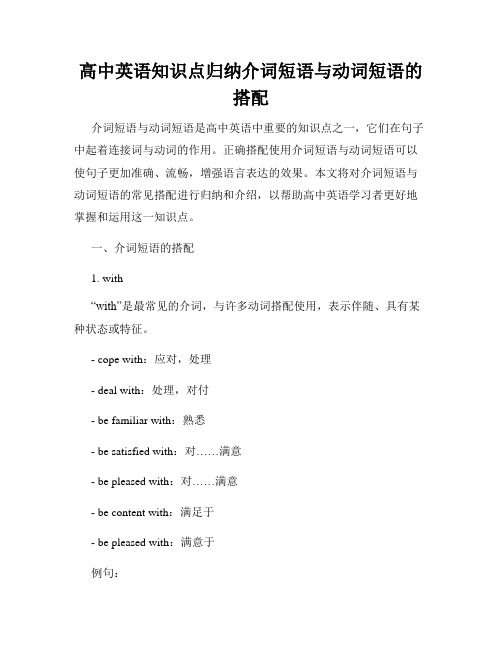
高中英语知识点归纳介词短语与动词短语的搭配介词短语与动词短语是高中英语中重要的知识点之一,它们在句子中起着连接词与动词的作用。
正确搭配使用介词短语与动词短语可以使句子更加准确、流畅,增强语言表达的效果。
本文将对介词短语与动词短语的常见搭配进行归纳和介绍,以帮助高中英语学习者更好地掌握和运用这一知识点。
一、介词短语的搭配1. with“with”是最常见的介词,与许多动词搭配使用,表示伴随、具有某种状态或特征。
- cope with:应对,处理- deal with:处理,对付- be familiar with:熟悉- be satisfied with:对……满意- be pleased with:对……满意- be content with:满足于- be pleased with:满意于例句:- He is good at coping with difficult situations.- We should learn how to deal with stress.- I am familiar with this city.- She is satisfied with her test results.2. in“in”在许多搭配中表示在某个时间、地点或范围之内的状态。
- be interested in:对……感兴趣- be engaged in:从事于- be experienced in:有经验- be confident in:对……有信心- be involved in:参与进……- be specialized in:专门从事- be successful in:在……方面成功例句:- He is very interested in learning new things.- She is engaged in a research project.- They are experienced in solving math problems.- We must be confident in our abilities.3. for“for”表示目的、理由、受益等概念,与动词搭配使用,使句子更加明确。
动词介词搭配
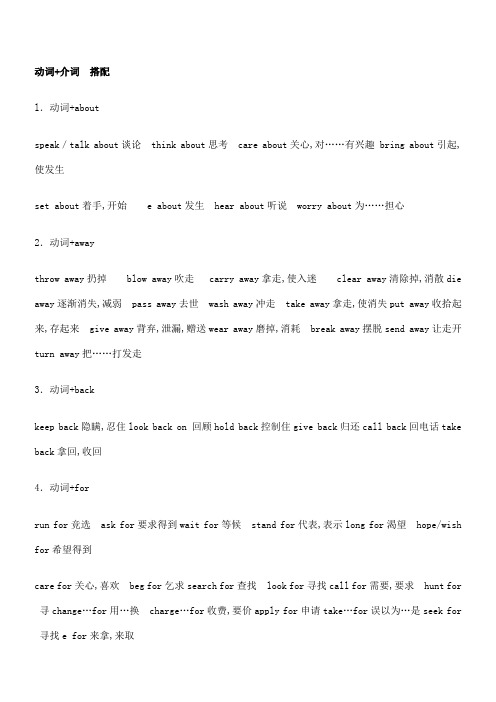
动词+介词搭配l.动词+aboutspeak/talk about谈论think about思考 care about关心,对……有兴趣 bring about引起,使发生set about着手,开始 e about发生 hear about听说 worry about为……担心2.动词+awaythrow away扔掉blow away吹走 carry away拿走,使入迷clear away清除掉,消散die away逐渐消失,减弱pass away去世 wash away冲走take away拿走,使消失put away收拾起来,存起来give away背弃,泄漏,赠送wear away磨掉,消耗break away摆脱send away让走开turn away把……打发走3.动词+backkeep back隐瞒,忍住look back on 回顾hold back控制住give back归还call back回电话take back拿回,收回4.动词+forrun for竞选ask for要求得到wait for等候stand for代表,表示long for渴望hope/wish for希望得到care for关心,喜欢beg for乞求search for查找look for寻找call for需要,要求hunt for 寻change…for用…换charge…for收费,要价apply for申请take…for误以为…是seek for 寻找e for来拿,来取5.动词+downburn down烧毁break down坏了,垮了,分解take down记下,记录turn down调小,拒绝cut down 削减,砍倒slow down慢下来pass down传下来put down记下,写下,镇压calm down平静下来bring down使……降低,使倒下settle down安家 e down下落,传下tear down拆毁,拆除6.动词+ate at向……袭击shout at冲某人嚷嚷run at冲向,向……攻击work at干……活动研究tear at用力撕look at看,注视stare at凝视glare at怒视glance at匆匆一瞥laugh at 嘲笑knock at敲门、窗等 point at指向smile at冲某人笑strike at向……打击aim at 向……瞄准shoot at向……射击wonder at惊讶call at拜访地点7.动词+fromdiffer from与……不同suffer from受……苦hear from收到……来信die from因……而死keep/stop/prevent…from阻止……learn from向……学习result from由于date from始于……时期separate…from把……分离开8.动词+ofthink of想到dream of梦到consist of由……组成speak of谈到approve of赞成die of死于talk of谈到hear of听说plain of抱怨bee of发生……情况,怎么啦9.动词+offstart off出发set off出发leave off中断show off炫耀get off下车take off脱下,起飞see off送行ring off挂断电话put off延期,推迟e off脱落,褪色cut off切断,断绝fall off跌落,掉下keep off避开,勿走近go off消失;坏了,爆炸,不喜欢knock…off把……撞落break off 打断pay off还清carry off携走带走,赢得get off脱下衣服等 give off散发出turn switch off关掉10.动词+ondepend on依靠rely on依靠insist on坚持carry on继续,进行keep/go on继续spend…on 在……花钱put on穿上,戴上,上演call on拜访move on继续移动,往前走live on以……为生feed on以……为生bring on使……发展take on雇用,呈现新面貌等 try on试穿have on穿着pass on传授,传递look on旁观turn switch on打开11.动词+outbreak out爆发point out指出pick out选出figure out算出,理解burst out进发bring out阐明,使表现出carry out执行,进行help out救助hold out坚持下去setout出发,着手,摆放wear out穿破,使……疲劳turn out结果是,生产,培养make out理解,看清楚e out出版,出来cross out 划掉leave out省略,删掉keep out of 使不进入,挡住work out算出,想出办法等find out查出,弄明白give out散发,分发,用完try out试用,试验lookout当心,提防put out扑灭speak out大胆讲出hand out散发send out发出,派遣run out用完go out熄灭let out泄漏,发出声音 ,出租die out灭绝12.动词十ingive in让步hand in上交bring in引进,使得到收入drop in拜访result in导致succeed in 在……获成功join in参加take in接纳,吸收,改小get in收获,进入break in强制进入,插话fill in填写call in召集,来访cut in插入persist in坚持look in来访,参观13.动词十intolook into研究,调查turn into变成burst into闯入,进发divide…into把……分成change…into 把……变成put/translate…into把……译成run into碰到send sb to/into sleep使进入状态14.动词+overturn over翻倒,细想think over仔细考虑go over审阅,检查,研究look over翻阅,检查get over 克服run over压死,看一遍take over接管,接替watch over看守,照看fall over跌倒,摔倒roll over翻滚15.动词十tobelong to属于object to反对refer to谈到,涉及,参阅point to指向turn to向……求助,查阅stick/hold/keep to坚持,忠于see to处理,料理e to共计,reply to答复get to到达bring to使苏醒把……比作pare…to与…相比;把…比作agree to同意write to写信给supply…to 为……提供lead to导致,通向add to增添attend to处理,专心,照料devote…to贡献给16.动词+upgrow up成长,长大give up放弃,献出build up建立setup架起、建立put up搭起,架起,安装,住宿,张贴,盖起do up整理,包装,打扮go up增长,上涨getup起床,站起pick up拾起,学会,用车,来接,收听到bring up抚养,呕吐,提出出现turn up开大音量等 ,出席stay up挺住,熬夜take up 开始学,从事,占据sit up熬夜eat up吃完use up用完tear up撕碎lay up储存makeup构成,组成编造弥补cut up切碎join up联结起来,参军end up总结e up上来,长出,出现speed up加快速度throw up呕吐clear up整理,收拾,放晴look up查找,找出burn up烧毁catch up赶上hurry up赶快fix up修理,安排,装置keep up保持hold up耽搁,使停顿send up发射ring up打电话open up开创,开辟divide up分配breakup分解17.动词十throughget through通过,干完,接通电话look through翻阅,看一遍,仔细查看go through审阅,检查,学习put…through接通电话see through识破check through核对pull through渡过危机,康复18.动词+withdeal with处理,对付 do with处理,需要 meet with遇到,遭受 talk with同……交谈agree with 同意,与……一致pare with与……相比bine with与……相联合equip…with以……装备cover…with用……覆盖 begin with以……开始 end up with以……结束supply…with以……供给provide…with以……供给 play with玩,玩弄1.动词+about speak/talk about谈论 think about思考 care about关心,对...有兴趣 bring about引起,使发生 set about 着手,开始 e about发生 hear about听说 worry about为...担心2.动词+away throw away 扔掉 blow away吹走 carry away拿走,使入迷 clear away清除掉,消散 die away逐渐消失 pass away 去世 wash away冲走 take away拿走 put away收拾起来,存起来 give away背弃,泄露 wear away磨掉,消耗 break away摆脱 send away让走开turn away把...打发走3.动词+back keep back隐瞒,忍住 hold back控制住 call back回电话 look back回顾 give back 归还 take back拿回,收回4.动词+for run for竞选 ask for要求得到 wait for等候 long for渴望 care for关心,喜欢 search for查找 call for要求,需要 change for用...换 apply for申请 seek for寻找 stand for代表,表示 hope/wish for希望得到 beg for乞求 look for寻找 hunt for 寻找 charge for收费,要价 take for误以为...是 e for来拿,来取5.动词+down burn down 烧毁 take down记下,记录 cut down削减,砍倒 pass down 传下来calm down平静下来 settle down 安家 tear down 拆毁,拆除 break down坏了,垮了,分解turn down调小,拒绝 slow down慢下来 put down记下,写下,镇压 bring down使...降低,使倒下 e down下落,传下6.动词+at e at 向...袭击 run at冲向,向...攻击 tear at用力撕 stare at凝视 glance at匆匆一瞥 knock at敲门,窗等 smile at冲某人笑 aim at向...瞄准 wonder at惊讶 shout at冲某人嚷嚷 work at干...活动研究 look at看,注视 glare at怒视 laugh at嘲笑 point at指向 strike at向...打击 shoot at向...射击 call at拜访地点7.动词+from differ from与...不同 suffer from受...苦 hear from收到...来信 die from 因...而死 keep/stop/prevent from不让...做 learn from向...学习 date from始于...时候 result from由于 separate from把...分离开8.动词+of think of想到 consist of由...组成 approve of赞成 talk of谈到 plain of 抱怨 dream of梦到 speak of 读到 die of死于 hear of听说 bee of发生...情况,怎么啦9.动词+off start off出发 set off出发 leave off''中断 show off炫耀 get off下车see off送行 put off延期,推迟 cut off切断,断绝 keep off避开,勿走近 knock off把...撞落 pay off还清 get off脱下衣服等 turn/switch off关掉 take off脱下,起飞 ring off 挂断电话 e off脱掉,褪色 fall off跌落,掉下 go off走开,消失,坏了 break off打断carry off携走,带走 give off散发出10.动词+on depend on依靠 insist on坚持 keep/go on继续 put on穿上,戴上,上演 move on 继续移动,往前走 feed on以...为生 take on 雇佣,呈现 have on穿着 look on 旁观rely on依靠 carry on继续,进行 spend on在...花钱 call on拜访 live on以...为生 bring on使...发展 try on试穿 pass on传授,传递 turn/switch on打开11.动词+out break out爆发 point out指出 pick out选出 burst out迸发 carry out 执行 hold out坚持下去 figure out 算出bring out 阐明,使表现出 help out救助 set out出发,着手 wear out穿破,使...疲劳 make out 理解,看清楚 cross out划掉 keep out of使不进入,挡住 find out查出,弄明白 try out 试用,试验 put out 扑灭 hand out 散发 run out用完 let out泄露,发出声音 turn out 结果是,生产 e out出版,出来 leave out省略,删掉 work out算出,想出办法等 give out散发,分发,用完 look out当心,堤防 speak out大胆讲出send out发出,派遣 go out 熄灭12.动词+in give in让步 bring in引进,使得到收入 result in导致 join in参加 get in 收获,进入 fill in填写 cut in插入 look in来访,参观 hand in上交 drop in拜访succeed in在...获得成功 take in接纳,吸收 break in强制进入,插话 call in召集,来访persist in坚持13.动词+into look into研究,调查 burst into闯入,迸发 change into把...变成 run into 碰到 turn into变成 divide into把...分成 put/translate into把...译成14.动词+over turn over翻倒,细想 go over审阅,检查,研究 get over克服 take over接管,接替 fall over跌倒,摔倒 think over仔细考虑 look over翻阅,检查 run over压死,看一遍 watch over看守,照看 roll over翻滚15.动词+to belong to属于 refer to谈到,涉及,参阅 turn to向...求助,查阅 see to处理,料理 reply to答复 object to反对 point to指向 stick/hold/keep to坚持,忠于 e to 共计,苏醒 get to到达 bring to使苏醒 agree to同意 supply to为...提供 add to增添devote to贡献给 pare to与...相比,把...比作 write to写信给 lead to导致,通向 attend to处理16.动词+up grow up 成长,长大 build up建立 put up 搭起,架起,安装,住宿,张贴,盖起 do up整理,包装,打扮 get up起床,站起 bring up抚养,呕吐,提出 stay up挺住,熬夜 sit up 熬夜 use up用完 lay up积蓄 cut up切碎 end up总结 speed up加快速度 clear up整理,收拾,放晴 burn up烧毁 hurry up赶快 keep up保持 send up发射 open up开创,开辟break up分解 give up放弃,献出 set up架起,建立 go up增长,上涨 pick up拾起,学会,用车,来接,收听到 turn up开大,出席,出现 take up开始学,从事,占据 eat up吃完 tear up 撕碎 make up构成,组成 join up联结起来,参军 e up上来,长出,出现 throw up呕吐 look up查找,找出 catch up赶上 fix up修理,安排,装置hold up耽搁,使停顿 ring up打电话 divide up分配17.动词+through get through通过,干完,接通电话 go through审阅,检查,学习 see through 识破 pull through渡过危机,康复 look through 翻阅,看一遍,仔细查看 put through接通电话 check through核对 18.动词+with deal with处理,对付 meet with遇到,遭受 agree with同意,与...一致 bine with与...相联合 do with处理,需要 talk with同...交流 pare with与...相比 equip with以...装备 cover with用...覆盖 end with以...结束 provide with 以...供给 begin with以...开始 supply with以...供给 play with 玩,玩弄19.三词以上的短语动词 add up to总计 keep away fro避开,别靠近m look down on 轻视put up with忍受 keep up with 赶上 make up for弥补 get on/along with和...相处 getclose to接近 get out of逃避,避免 set fire to放火烧 take notice of注意 do well in 在...干得好 take a photo of拍...照片 make fun of开玩笑,取笑 get used to习惯于 keep in touch with保持联系 e into being出现 take pride in为...而自豪 take an interest in 对...感兴趣 make a fool of愚弄 take charge of负责 make friends with同...交朋友 take part in参加 catch sight of看见 break away from摆脱 do away with废除 look up to仰望,尊敬 catch up with 赶上 run out of用完 go on with继续 look forward to盼望 take hold of握住 get down to认真开始 pay attention to注意 set an example to为...树立榜样 pay a visit to访问 take the place of取代 make use of利用 get into the habit of染上...的习惯 get rid of摆脱 keep an eye on堤防。
高中英语知识点归纳动词和介词搭配的固定搭配
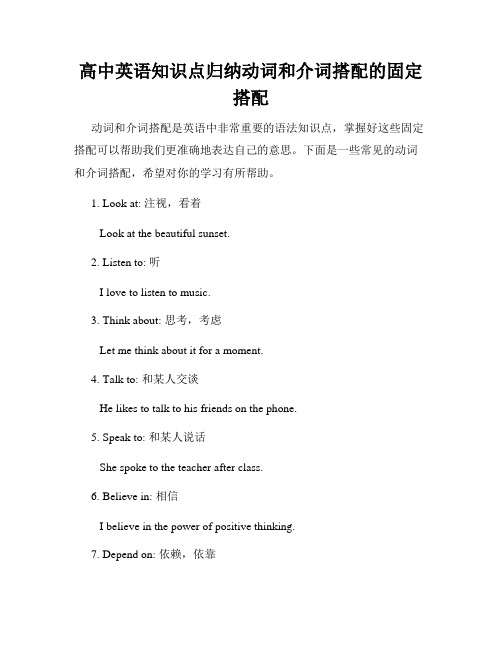
高中英语知识点归纳动词和介词搭配的固定搭配动词和介词搭配是英语中非常重要的语法知识点,掌握好这些固定搭配可以帮助我们更准确地表达自己的意思。
下面是一些常见的动词和介词搭配,希望对你的学习有所帮助。
1. Look at: 注视,看着Look at the beautiful sunset.2. Listen to: 听I love to listen to music.3. Think about: 思考,考虑Let me think about it for a moment.4. Talk to: 和某人交谈He likes to talk to his friends on the phone.5. Speak to: 和某人说话She spoke to the teacher after class.6. Believe in: 相信I believe in the power of positive thinking.7. Depend on: 依赖,依靠You can always depend on me for support.8. Count on: 依赖,指望You can count on him to finish the project on time.9. Agree with: 同意I agree with your opinion.10. Apologize to: 向某人道歉He apologized to me for being late.11. Apply for: 申请She applied for a job at the company.12. Care about: 关心I care about the environment.13. Complain about: 抱怨He complained about the poor service.14. Dream about/of: 梦想I dream about/of traveling the world.15. Excuse for: 原谅,为...找借口Please excuse him for his mistake.16. Compare to/with: 比较You can't compare apples to oranges.17. Concentrate on: 集中注意力于I need to concentrate on my studies.18. Confide in: 吐露,倾诉She confided in me about her problems.19. Apply to: 适用于,申请加入This rule applies to everyone.20. Belong to: 属于The book belongs to me.这些是一些常见的动词和介词搭配,希望能够帮助你更好地理解和运用它们。
动词与介词的搭配
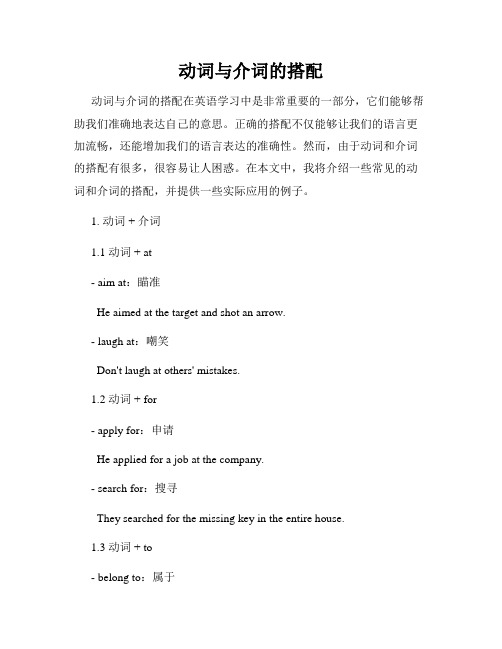
动词与介词的搭配动词与介词的搭配在英语学习中是非常重要的一部分,它们能够帮助我们准确地表达自己的意思。
正确的搭配不仅能够让我们的语言更加流畅,还能增加我们的语言表达的准确性。
然而,由于动词和介词的搭配有很多,很容易让人困惑。
在本文中,我将介绍一些常见的动词和介词的搭配,并提供一些实际应用的例子。
1. 动词 + 介词1.1 动词 + at- aim at:瞄准He aimed at the target and shot an arrow.- laugh at:嘲笑Don't laugh at others' mistakes.1.2 动词 + for- apply for:申请He applied for a job at the company.- search for:搜寻They searched for the missing key in the entire house.1.3 动词 + to- belong to:属于This book belongs to me.- listen to:听She likes to listen to music while studying.2. 动词 + 介词短语2.1 动词 + in- believe in:相信I believe in the power of hard work.- specialize in:专攻He specializes in computer programming.2.2 动词 + on- insist on:坚持She insisted on going to the party, despite her illness. - rely on:依赖We rely on public transportation to get to work.3. 动词 + 介词短语 + 名词3.1 动词 + on + 名词- rely on:依赖We rely on our friends for support.- comment on:评论The teacher commented on the student's essay.3.2 动词 + to + 名词- apologize to:向...道歉He apologized to his friend for being late.- introduce to:介绍给She introduced her brother to her classmates.综上所述,掌握动词与介词的搭配对于英语学习者来说是非常重要的。
动词与介词的搭配
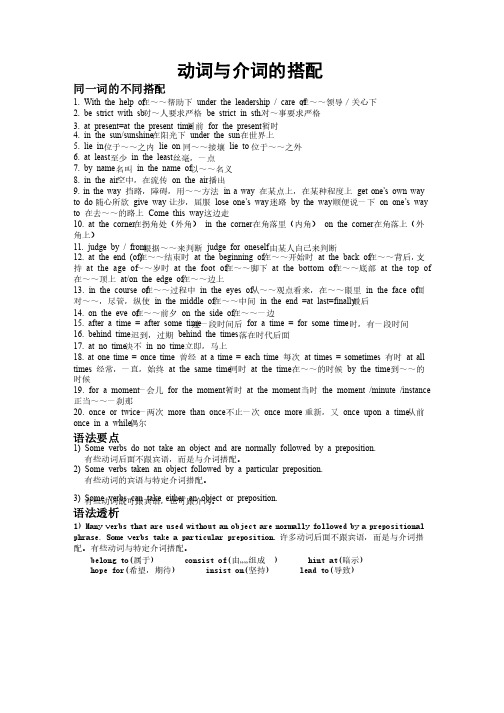
动词与介词的搭配同一词的不同搭配 1. With the help of 在~~帮助下在~~帮助下 under the leadership / care of 在~~领导/关心下在~~领导/关心下2. be strict with sb. 对~人要求严格对~人要求严格 be strict in sth. 对~事要求严格对~事要求严格3. at present=at the present time 目前目前 for the present 暂时暂时暂时4. in the sun/sunshine 在阳光下在阳光下 under the sun 在世界上在世界上在世界上 5. lie in 位于~~之内位于~~之内位于~~之内 lie on 同~~接壤同~~接壤 lie to 位于~~之外位于~~之外6. at least 至少至少至少 in the least 丝毫,一点丝毫,一点丝毫,一点 7. by name 名叫名叫名叫 in the name of 以~~名义以~~名义8. in the air 空中,在流传空中,在流传 on the air 播出播出播出 9. 9. in in in the the the way way 挡路,障碍,用~~方法挡路,障碍,用~~方法 in in a a a way way 在某点上,在某种程度上在某点上,在某种程度上 get get one’s one’s one’s own own own way way to do 随心所欲随心所欲 give way 让步,屈服让步,屈服 lose one’s way 迷路迷路 by the way 顺便说一下顺便说一下顺便说一下 on one’s way to 在去~~的路上在去~~的路上 Come this way 这边走这边走这边走 10. at the corner 在拐角处(外角)在拐角处(外角) in the corner 在角落里(内角)在角落里(内角)在角落里(内角) on the corner 在角落上(外在角落上(外角上)角上)11. judge by / from 根据~~来判断根据~~来判断 judge for oneself 由某人自己来判断由某人自己来判断由某人自己来判断 12. at the end (of) 在~~结束时在~~结束时 at the beginning of 在~~开始时在~~开始时 at the back of 在~~背后,支持 at the age of ~~岁时~~岁时 at the foot of 在~~脚下在~~脚下 at the bottom of 在~~底部在~~底部 at the top of 在~~顶上在~~顶上 at/on the edge of 在~~边上在~~边上13. in the course of 在~~过程中在~~过程中 in the eyes of 从~~观点看来,在~~眼里从~~观点看来,在~~眼里 in the face of 面对~~,尽管,纵使对~~,尽管,纵使 in the middle of 在~~中间在~~中间 in the end =at last=finally 最后最后14. on the eve of 在~~前夕在~~前夕 on the side of 在~~一边在~~一边15. after a time = after some time 过一段时间后过一段时间后 for a time = for some time 一时,有一段时间一时,有一段时间16. behind time 迟到,过期迟到,过期迟到,过期 behind the times 落在时代后面落在时代后面落在时代后面 17. at no time 决不决不 in no time 立即,马上立即,马上立即,马上 18. 18. at at at one one one time time time = = = once once once time time 曾经曾经 at at a a a time time time = = = each each each time time 每次每次 at at times times times = = = sometimes sometimes 有时有时 at at all all times 经常,一直,始终经常,一直,始终 at the same time 同时同时 at the time 在~~的时候在~~的时候在~~的时候 by the time 到~~的到~~的时候时候19. for a moment 一会儿一会儿 for the moment 暂时暂时暂时 at the moment 当时当时当时 the moment /minute /instance 正当~~一刹那正当~~一刹那20. once or twice 一两次一两次 more than once 不止一次不止一次不止一次 once more 重新,又重新,又 once upon a time 从前从前 once in a while 偶尔偶尔语法要点 1) Some verbs do not take an object and are normally followed by a preposition. 有些动词后面不跟宾语,而是与介词搭配。
介词短语与动词短语的搭配

介词短语与动词短语的搭配在英语中,介词短语与动词短语的搭配是语法和语义上的重要组成部分。
正确的使用介词和动词的搭配可以使句子更加准确和流畅。
本文将详细探讨介词短语与动词短语的搭配,并提供一些常用的搭配示例。
一、介词短语的作用与搭配介词短语是由介词及其宾语组成的短语结构。
它通常用来表示位置、方向、时间、原因、目的等相关关系。
动词与介词短语的搭配可以改变动词的意义,使句子更具描述力。
以下是一些常见的介词短语与动词的搭配示例:1. Look at(观察)Look at the beautiful sunset.观看美丽的日落。
2. Talk about(谈论)Let's talk about our plans for the weekend.我们来谈谈周末的计划。
3. Listen to(听)Listen to the sound of the waves.听听海浪的声音。
4. Think of(考虑)I'm thinking of going on a vacation.我正在考虑去度假。
5. Believe in(相信)I believe in the power of love.我相信爱的力量。
6. Depend on(依赖)Don't depend on others for your happiness.不要依赖别人来获得幸福。
7. Apologize to(向...道歉)He apologized to me for his mistake.他为他的错误向我道歉。
8. Care about(关心)She cares about the environment.她关心环境。
二、动词短语的作用与搭配动词短语是由动词及其宾语、副词或者介词短语组成的短语结构。
动词短语可以表示动作、行为、状态等。
以下是一些常见的动词短语及其搭配示例:1. Come up with(提出)Can you come up with a better solution?你能提出一个更好的解决方案吗?2. Give up(放弃)Don't give up easily when facing challenges.面对挑战时不要轻易放弃。
动词介词搭配用法
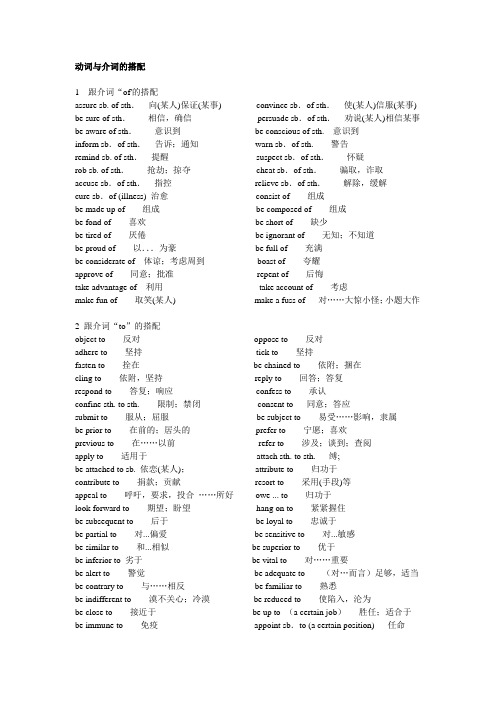
动词与介词的搭配1 跟介词“of'的搭配assure sb. of sth.向(某人)保证(某事) convince sb.of sth.使(某人)信服(某事) be sure of sth.相信,确信persuade sb.of sth.劝说(某人)相信某事be aware of sth.意识到be conscious of sth. 意识到inform sb.of sth.告诉;通知warn sb.of sth. 警告remind sb. of sth.提醒suspect sb.of sth.怀疑rob sb. of sth.抢劫;掠夺cheat sb.of sth.骗取,诈取accuse sb.of sth.指控relieve sb.of sth.解除,缓解cure sb.of (illness) 治愈consist of 组成be made up of 组成be composed of 组成be fond of 喜欢be short of 缺少be tired of 厌倦be ignorant of 无知;不知道be proud of 以...为豪be full of 充满be considerate of 体谅;考虑周到boast of 夸耀approve of 同意;批准repent of 后悔take advantage of 利用take account of 考虑make fun of 取笑(某人) make a fuss of 对……大惊小怪;小题大作2 跟介词“to”的搭配object to 反对oppose to 反对adhere to 坚持tick to 坚持fasten to 拴在be chained to 依附;捆在cling to 依附,坚持reply to 回答;答复respond to 答复;响应confess to 承认confine sth. to sth. 限制;禁闭consent to 同意;答应submit to 服从;屈服be subject to 易受……影响,隶属be prior to 在前的;居头的prefer to 宁愿;喜欢previous to 在……以前refer to 涉及;谈到;查阅apply to 适用于attach sth. to sth. 缚;be attached to sb. 依恋(某人);attribute to 归功于contribute to 捐款;贡献resort to 采用(手段)等appeal to 呼吁,要求,投合……所好owe ... to 归功于look forward to 期望;盼望hang on to 紧紧握住be subsequent to 后于be loyal to 忠诚于be partial to 对...偏爱be sensitive to 对...敏感be similar to 和...相似be superior to 优于be inferior to 劣于be vital to 对……重要be alert to 警觉be adequate to (对…而言)足够,适当be contrary to 与……相反be familiar to 熟悉be indifferent to 漠不关心;冷漠be reduced to 使陷入,沦为be close to 接近于be up to (a certain job)胜任;适合于be immune to 免疫appoint sb.to (a certain position) 任命commit sb.to sth. 使某人承担义务entitle sb.to sth. 给某人权利;entitle sth. 给起名accommodate oneself to 使...适应adjust oneself to 使适应;调整accustom oneself to 习惯于dedicate oneself to 献身于devote oneself to 献身于expose oneself to 使暴露;使面临restrict oneself to 限制resign oneself to 顺从于;甘心于limit oneself to 限制commit oneself to 献身于3 跟介词"from”的搭配·tell ... from 区分;辨别distinguish...from 区分;辨别separate ... from 分;分开originate from 来源于arise from 由……而产生;derive from 起源;由来由……而引起result from 由……而产生prevent sb. from 防止prohibit sb. from 禁止;阻止deter sb. from 阻止;吓住hinder ... from 阻止dissuade sb. from 劝说,protect ... from 保护shield ... from 保护keep from 阻止;隐满refrain from 忍住;抑制住release ... from 解脱;释放restrain from 抑制;限制immune ... from 免除exempt ... from 免除rescue ... from 挽救,营救eliminate ... from 排除secure sb. from 使某人安全;不受打击save ... from 挽救escape from 躲避;逃脱find shelter from 躲避;庇护free ... from 解除;使摆脱abstain from 回避;戒,弃权differ from 不同defend ... from 保护;保卫suffer ... from 遭受distract ... from 使分心dismiss ... from 开除;解雇abstract from 从...提取deduct …from 扣除;减去withdraw from 退出;撤退vary from 不同deduce from 推断preserve ... from 保护;保存extract …from 从……取出,设法得到be distinct from 不同4 跟介词"for"的搭配request for sth./ request to do sth. 要求seek for 寻求appeal to sb. for sth. 请求,呼吁apply for sth. 申请fit for 适合mistake ... for 误认为hunger for 渴望wait for 等候beg for sth. 乞求be bound for sw. 开往……的;be responsible for 负责be suitable for 适合be famous for 以……出名have a bent for sth. 爱好have a desire for 要求;需要5 跟介词“on”的搭配depend on 依靠count on 依靠;指望rely on 依靠;依赖be based on 把……基于center on sth. 集中在……上be bent on sth. 坚决;一心要干某事concentrate on 集中comment on 评论congratulate sb. on sth. 祝贺operate on 动手术put emphasis on sth. 强调insist on 坚持be hard on sb. 过分严厉对待impose sth. on sb. 把……强加于be keen on 喜爱;渴望6 跟介词“in”的搭配believe in 相信consist in 在于,存在于result in 导致persist in 坚持engage in 参加;从事succeed in 成功be involved in sth. 卷入invest in 投资be absorbed in 吸引,使专心take part in 参加participate in 参加take delight in 喜欢take pride in 以...自豪be active in 积极参加have confidence in 信任have faith in 相信。
如何正确使用介词与动词搭配
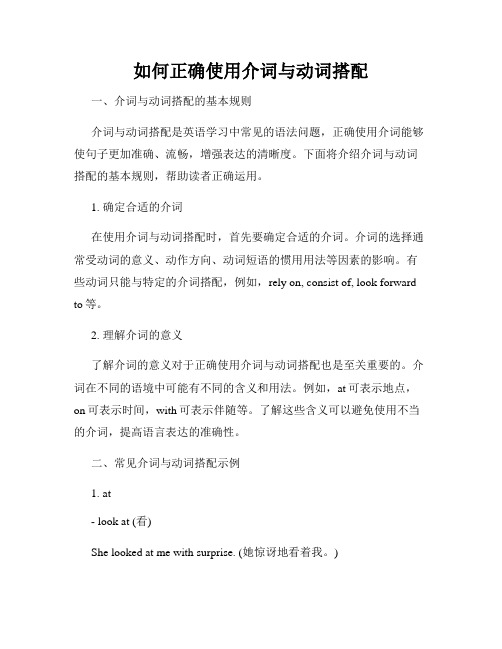
如何正确使用介词与动词搭配一、介词与动词搭配的基本规则介词与动词搭配是英语学习中常见的语法问题,正确使用介词能够使句子更加准确、流畅,增强表达的清晰度。
下面将介绍介词与动词搭配的基本规则,帮助读者正确运用。
1. 确定合适的介词在使用介词与动词搭配时,首先要确定合适的介词。
介词的选择通常受动词的意义、动作方向、动词短语的惯用用法等因素的影响。
有些动词只能与特定的介词搭配,例如,rely on, consist of, look forward to等。
2. 理解介词的意义了解介词的意义对于正确使用介词与动词搭配也是至关重要的。
介词在不同的语境中可能有不同的含义和用法。
例如,at可表示地点,on可表示时间,with可表示伴随等。
了解这些含义可以避免使用不当的介词,提高语言表达的准确性。
二、常见介词与动词搭配示例1. at- look at (看)She looked at me with surprise. (她惊讶地看着我。
)- laugh at (嘲笑)They laughed at his clumsy performance. (他们嘲笑他笨拙的表演。
) - arrive at (到达)We arrived at the airport on time. (我们准时到达了机场。
)2. on- depend on (依赖)I depend on my friends for support. (我依赖朋友们的支持。
)- focus on (关注)The presentation focused on the importance of teamwork. (演讲关注了团队合作的重要性。
)- decide on (决定)After much discussion, they decided on a plan. (经过许多讨论,他们决定了一个计划。
)3. in- believe in (相信)I believe in the power of positive thinking. (我相信积极思考的力量。
动词和介词搭配的短语
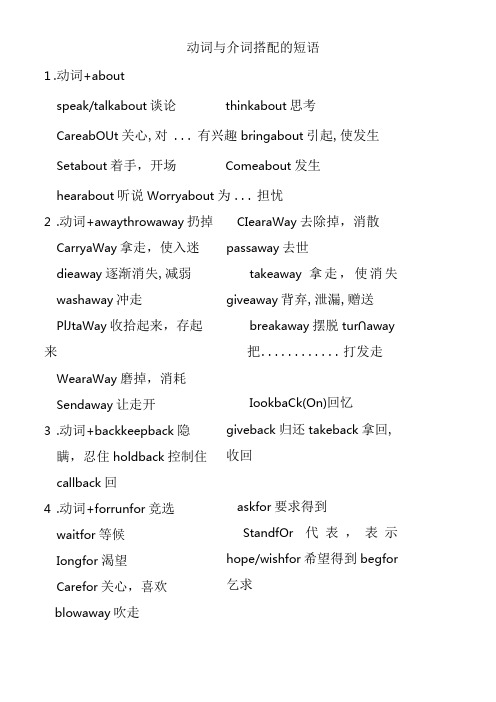
动词与介词搭配的短语1.动词+aboutspeak/talkabout谈论thinkabout思考CareabOUt关心,对 ... 有兴趣bringabout引起,使发生Setabout着手,开场Comeabout发生hearabout听说Worryabout为... 担忧2.动词+awaythrowaway扔掉CarryaWay拿走,使入迷dieaway逐渐消失,减弱washaway冲走PlJtaWay收拾起来,存起来WearaWay磨掉,消耗Sendaway让走开3.动词+backkeepback隐瞒,忍住holdback控制住callback回4.动词+forrunfor竞选waitfor等候Iongfor渴望Carefor关心,喜欢blowaway吹走CIearaWay去除掉,消散passaway去世takeaway拿走,使消失giveaway背弃,泄漏,赠送breakaway摆脱tur∩away把............ 打发走IookbaCk(On)回忆giveback归还takeback拿回,收回askfor要求得到StandfOr代表,表示hope/wishfor希望得到begfor 乞求Searchfor 查找 Iookfor 寻找Cailfor 需要,要求huntfor 寻找 change...forffl ............ 换 Cha 「ge...for 收费,要价 applyfor 申请take …for 误以为 是ComefOr 来拿,来取breakdown 坏了,垮了,分解turndown 调小,拒绝 SloWdoWn 慢下来PUtdOWn 记下,写下,镇压 bringdown 使 降低,使倒下 comedown 下落,传下ShoUtat 冲(某人)嚷嚷 Workat 干……活动(研究) IoOkat 看,注视 glareat 怒视 Iaughat 嘲笑 pointat 指向 Strikeat 向 打击 Shootat 向 射击seekfor 寻找 5 .动词+down burndown 烧毁 takedown i 己下,i 己录 cutdown 削减,砍倒 passdown 传下来 calmdown 平静下来 settledown 安家 teardown 拆毁,撤除 6 .动词+atcomeat 向 ... 袭击 runat 冲向,向 ... 攻击 tearat 用力撕Stareat )疑视 gla∩ceat匆匆一瞥 knockat 敲(门、窗等) smileat 冲(某人)笑 aimat 向 .......... 瞄准wonderat 惊讶callat拜访(地点)7.动词+fromdifferfrom 与 .. 不同 Sufferfrom 受 .. 苦 hearfrom 收到 . 来信diefrom 因 ... 而死keep/stop/prevent...from 阻止...Iearnfrom 向 ....... 学习resultfrom 由于datefrom 始于separate...from 把别离开8.动词+ofthinkof 想到dreamof 梦到 Consistof 由 ... 组成 approveof 赞成 talkof 谈到 Complainof 抱怨 9 .动词+offStartoff 出发setoff 出发Ieaveoff 中断 Showoff 炫耀getoff 下车 takeoff 脱下,起飞seeoff 送行 ringoff 挂断Comeoff 脱落,褪色 falloff 跌落,掉下g∞ff 消失;坏了,爆炸,不喜欢 breakoff 打断时期speakof 谈至 IJ dieof 死于 hearof 听说becomeof 发生..….情况,若何PUtoff 延期,推迟 CUtoff 切断,断绝keepoff 避开,勿走近 knock...off 把 .... 撞落 payoff 还清 getoff 脱下(衣服等)Carryoff携走带走,赢得giveoff散发出turn(switch)off 关掉 10 .动词+onbreakout 爆发pointout 指出pickout 选出figureout 算出,理解burstout 进发bAngout 说明,使表现出carryout 执行,进展helpout 救助holdout 坚持下去SetoIlt 出发,着手,摆放WearoUt 穿破,使……疲劳turnout 结果是,生产,培养 makeout 理解,看清楚comeout 出版,出来 Crossout 划掉IeaVeOlJt 省略,删掉keep 。
介词的动词搭配

介词的动词搭配介词和动词的搭配在英语中起着非常重要的作用,它们能够帮助我们准确地表达动作或位置的关系。
正确的使用介词和动词的搭配能够提升语言的准确性和表达的清晰度。
本文将介绍一些常见的介词和动词搭配,以帮助读者在英语写作和口语交流中更加得心应手。
1. 固定搭配有一些介词和动词有着固定的搭配,即它们只能搭配特定的介词,使用其他介词可能会改变原本的意思。
例如:- rely on 依赖- specialize in 专攻- consist of 由……组成- participate in 参与- contribute to 贡献于- focus on 集中于2. 位置关系介词在描述位置关系时非常常见。
以下是一些常见的介词和动词搭配,用于描述位置关系:- be in 位于- be on 在……上- be at 在……处- be under 在……下面- be beside 在……旁边- be between 在……之间3. 时间关系介词还常常用于描述时间关系。
以下是一些常见的介词和动词搭配,用于描述时间关系:- be at 在……时- be from 从……起- be during 在……期间- be before 在……之前- be after 在……之后4. 结果、原因和方式除了位置和时间关系外,介词还可以用于描述结果、原因和方式等。
以下是一些常见的介词和动词搭配,用于描述结果、原因和方式:- be for 为了- be against 反对- be about 关于- be by 通过- be with 伴随- be without 没有5. 搭配变化需要注意的是,动词的搭配可能因为时态、语态或其他语法要求而有所变化。
例如,动词"look"的搭配可以根据时态的不同而变化:- look at 看- looked at 看过- will look at 将要看总结:介词和动词的搭配是英语中必须掌握的重要语法规则之一。
- 1、下载文档前请自行甄别文档内容的完整性,平台不提供额外的编辑、内容补充、找答案等附加服务。
- 2、"仅部分预览"的文档,不可在线预览部分如存在完整性等问题,可反馈申请退款(可完整预览的文档不适用该条件!)。
- 3、如文档侵犯您的权益,请联系客服反馈,我们会尽快为您处理(人工客服工作时间:9:00-18:30)。
动词与介词搭配 This manuscript was revised by the office on December 22, 2012§4.4 动词词组1.动词与表示根源和来源的介词连用(1)fromcome from(起源于、出生于、来自),rise from(起源于),derive from(起源于),arise from(发生于、由…而产生),spring from(来自于、崛起于),emerge from(出现于),result from (产生于、起源于),stem from(发生于、滋长于),emanate from(流出于、出生于),grow from(由…而生),originate from(起源于),proceed from (发生于、由…发出),be derived from(临摹、出身于),be descended from(为…之后裔、系出……),copy from(抄录自),translate from (翻译自),quote from(引用自),adapt from(改编自)。
a.I have risen from the ranks to a major.b.Her money came from a rich uncle.c.Serious damage may arise from carelessness.d.These spring from tiny seeds.e.He is sprung from royal blood.他出身皇家。
f.Something has resulted from my efforts.g.According to the Bible,we are all descended from Adam.h.This picture is a copy from Raphael.i.Thousands of English words are derived from/derive from Latin.quote from the classics(引自古文),draw water from a well(从井里汲水),drink from a river(临河而饮),draw conclusions from the evi-deuce(由证据中取得结论)。
①originate(来自),当来源是事物时,用from或in皆可;当来源为人时,用from或with皆可。
②come from有两个含义:一是表示“籍贯(出生于何处)”=come of;一是表示“来自何处”。
其区别在于动词时态的不同。
当表示“籍贯”时,动时用现在时,因籍贯是永远不变的。
当表示“来自何处”时为叙述过去的事情,故用过去时或现在完成时。
试比较:a.Where do you come from你籍贯何处(以现在时构成问句)I come from Beijing.我是北京出生的。
b.Where did/have you come from你来自何处I came/have come from Beijing.我从北京来。
(不一定是北京人)(2)of①ask(要求、请求、询问)ask的对象为人时,可用ask sb.或ask of sb.;ask sth.of sb.表示“请求某人做某事、或询问某人某事”。
a.May I ask a favour of youb.May I ask a question of youc.He asked his way of a hunter.②beg(请求、要求)a.He begged a favour of me.b.He begged money of charitable people.③inquire(询问、探询)inquire的宾语为人时,不能直接接人,须接介词of再接人,成为inquire of sb.。
如欲表示“询问某事”时,须用介词about:inquire of sb.about sth.,意为“询问某人某事”。
inquire的宾语为地方时,接at:I'll inquire at the office and then tell you.我去办公室打听一下再告诉你。
a.I inquired of him the way to town.b.He inquired of me the best wayto go.c.I inquired of him about the matter.d.She inquires of him about her younger brother's conduct.④require(要求)如仅表示“向某人要求”时,require 后接of再接人,成“require of sb.”的形式。
如欲表示“要求某人做某事、向某人要求某物”时,用require sth.of sb.句型。
a.I have done everything that was required of me.b.What do you require of mec.She required an apology of me.她要我道歉。
⑤demand(要求)demand必须加of再加被要求的人,demand of sb.表示“向某人要求”。
demand sth.of sb.表示“向某人要求某物(做某事)”。
试比较:a.我要求他答复。
I demand him of an answer.I demand an answer of him.b.He demands too high a price of me.⑥come of(出身、出自),be born of (出生)a.He comes of ancient family.b.She was born of good parents.她出身良家。
a)from与of皆可用以表示“起源、出处”,但何时用from,何时用of,须视动词而定。
因此对于from和of所跟的动词必须加以区别熟记。
b)of,from皆可用以表示“种族、门第”,但何时用from,何时用of,亦决定于动词的不同。
一般spring,be derived,be descended 接from,come,be born接of。
c)某些动词之后可接from或of,意义相同,但接from居多。
此类动词大多表示“获得、期望”之意,如buy,borrow,hire,receive,learn,have(得到),expect,want等。
a.She learned her English of /from an American.b.All these books may be hadof/from any booksellers.c.Everyone expected great things of/from him.d)come from表示“籍贯”或“来自何处”。
come of则表示“出身、家庭”。
试比较:a.He comes from Tianjin.他籍贯是天津。
b.He came from beyond the seas yesterday.他昨天从海外来。
c.He comes of good family.他出身良家。
d.He came of a poor peasant family.他出身于贫穷农家。
(3)out ofask out of(由…而发问),pick out of(由…挑选),write out of one's own head(创作),pay out of one's own pocket(自己出钱)。
a.He asked out of curiousity.b.You will have to pay out of your own pocket.2.动词和表示推断的介词连用(1)fromjudge from/by(由…判定、由…判断),conclude from(由…判定),infer from(由…推论、由…推断),deduce from(由…推论、由…推断),judge from/by appearance(以貌取人),speak from experience (经验之谈),paint from nature(模仿自然作画、写生)。
a.Judging from what you say,he ought to succeed.b.Judging from/by his appearance,he seems to be a man of good conduct.(2)byjudge by,know by(由…知),call by(据…而叫),tell by(由…知),recognize a person by the voice(依声音辨别某人)。
a.A man is usually judged by what he does.b.He is called by the name of his father.c.A man is known by the company he keeps.观其所交,而知其人。
3.动词和表示比较的介词连用(1)tocompare to(把…比作),liken to (与…相象),prefer…to(较喜欢…而不喜欢…),其中to为介词。
a.Life is compared to a voyage.人生好比航海。
b.Life is likened to an act of the stage.人生好比舞台上一幕戏。
c.I prefer death to dishonour.d.I prefer working to doing nothing.compare with(与…比较),contrast with(对照、对比),increase with (随…而增加),vary with(随…而变化)。
a.His English cannot compare with mine.b.That will show a great increase compared with today.c.I contrast this picture with that.d.You may contrast this book with another one.e.An army's power increases with its size.f.The size varies with the temperature.4.动词和表示原因及动机的介词连用suffer from(受…之苦),act from (由…而行动),die from被用做表示死亡之原因时,其含意是由于外界添加的刺激或影响而致死的,而不是出于本人自身的原因。
